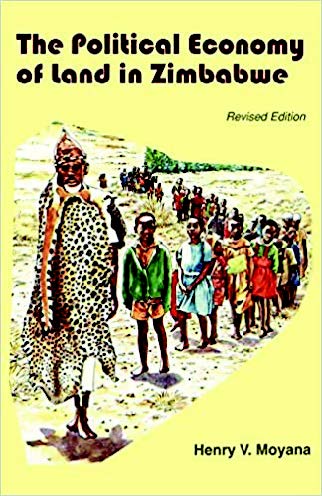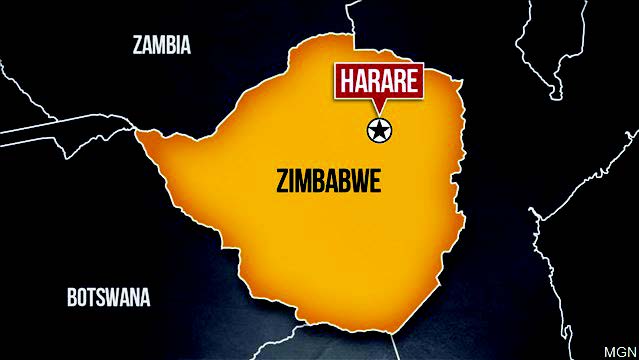With the Zimbabwean economy in free fall, the government has agreed to pay $3.5 billion in compensation to White farmers. The land, which was originally attained by the White settler colony under British colonial rule, was expropriated by the Robert Mugabe government to resettle displaced Black families.

The agreement signed July 29 at President Emerson Mnangagwa’s State House offices in the capital Harare shows “White farmers would be compensated for infrastructure on the farms and not the land itself, as per the national constitution,” reported Al-Jazeera.
How Mnangagwa could utter that this signing “brings closure and a new beginning in the history of the land discourse in Zimbabwe” is quite remarkable.
The president said, “The process which has brought us to this event is equally historic as it is a reaffirmation of the irreversibility of land as well as a symbol of our commitment to constitutionalism, the respect of the rule of law and property rights.”
How this Mugabe replacement could shape his mouth to say respect for law and property rights when the land stolen and appropriated land by Whites from Black Africans (who have lived and farmed on this land since time immemorial) is egregious, and absurd.
The country continues to suffer economically and political and street demonstrations have followed.
The “#ZimbabweanLivesMatter” tag a take on “Black Lives Matter,” started after security forces began blocking streets. It draws on the global movement highlighting racial injustice, including police violence that gained global attention after the death in May of George Floyd in Minneapolis at the hands of the police.

The online campaign resulted in one day, receiving more than 700,000 tweets, from celebrity types, and sports figures, in and outside of the country, including top pop stars, and Pearl Thusi, who starred in Africa’s Netflix series, “Queen Sono.”
Zimbabwe’s ruling party threatened the United States ambassador with expulsion, calling him a “thug” and accusing him of funding organizers of antigovernment protests, the Associated Press reported. “Zimbabwe’s government in recent weeks has increasingly accused the U.S. Embassy of supporting anti-government activists who are piling pressure on President Emmerson Mnangagwa as the economy collapses amid new allegations of corruption and human rights abuses,” said the U.S.-based wire service.
“Ruling ZANU-PF party spokesman Patrick Chinamasa … said U.S. Ambassador Brian Nichols and a ‘coterie of gangsters’ should stop ‘mobilizing and funding disturbances, coordinating violence and training insurgency,’ ” AP said. “Diplomats should not behave like thugs, and Brian Nichols is a thug,” said the Zimbabwean official.
Inside the country, there were complaints that police were detaining activists and failing to respect human rights. Little has changed since the late Robert Mugabe in 2017 left power. Zimbabwe’s current president is also under U.S. sanctions for alleged abuses, AP said.
Zimbabwe’s land question involves displacement of hundreds of thousands of its native population. President Mnangagwa, trying to curry favor with the U.S. and the West, gave away money the country does not have.
Compensating Whites who displaced the original landowners is an absurdity.
Henry V. Moyana, whose family was displaced by White settlers, wrote about it in his 2000 book, “The Political Economy of Land in Zimbabwe.”
Pushing Africans of off fertile land towards “land segregation” or the creation of “reserves was partly inspired by a desire on the part of the settlers to eliminate the African from competition in the economic field,” Moyana observed.
In other words, putting Africans on the most infertile, unproductive land possible would eliminate native competition.
The Chief Native Commissioner alluded to this in a 1918 report: “The native should be trained not so much as a competitor with the white man in the business of life but as a useful auxiliary to help in the progress of the country.”
The system also included natives working the fertile now White-owned land that natives had been displaced off of.
This system of land expropriation, with its various iterations, continued into the second World War and beyond.

After WWII, “veterans who had helped Britain in the war went to Zimbabwe where a land resettlement scheme had been worked out for them. They went with nothing but upon arrival they were given farms, farm equipment, loans and the inputs. They paid for all these in annual installments with the money they earned from their farming activities. This is how the commercial farming sector developed so rapidly in Zimbabwe. Within a few years many of these farmers went on to become multi-millionaires. This then was a viable resettlement formula for people who did not have capital to purchase land and develop it.”
In 1980, during independence, Africans, who had been deprived since 1890, found themselves still in same land deprived conditions. According to Moyana, it was “understandable that a similar formula was tried.”
The application of this formula may not have been as airtight in that it was mostly applied to ZANU-PF members. “But as a strategic option,” Moyana wrote, “aimed at assisting Africans to get involved with large scale commercial agriculture, it was clearly well conceived.”
He predicted that this is a problem that will be with us “for a long time.”
In the Reginald L. Streater, Esq 2019 study on land reform, “Zimbabwe’s struggle to break the chains of colonialism: self-determination, land reform and international law,” he notes Zimbabwe’s Patriotic Front’s inclination during independence negotiations at the Lancaster House was its unwillingness to “concede to the idea of mandating Zimbabwe to be responsible for the compensation of stolen ancestral land.”
Patriotic Front’s declared: “If this London conference reaches no decisions, we will dispatch our military men back to Africa. This means intensification of the struggle. We can win without Lancaster House. That is a certainty. Of course, we would welcome a settlement. But we can achieve peace and justice for our people through the barrel of a gun.”
Only after “oral” assurances that Great Britain would shoulder much of the financial burden, along with a pledge from the United States did the Patriotic Front acquiesce and feel “compelled to accept undoubtedly sincere, but still vague, promises of assistance.” The Accords would not have been successful if Great Britain had not offered to subsidize Land Reform.
A surprise during the last leg of talks was sprung by the Margaret Thatcher Conservative government.
“The representatives found themselves confronted by an uncomfortable compromise that would commit them to respecting existing European property rights and debar them from any expropriation of land during the first 10 years of independence, while the constitution negotiated Lancaster House remained in force,” according to the UK-based Independent newspaper.
Consequently, the Accords were mostly shaped by British interests. Its Rhodesian colonial region in 1965 under Ian Smith had gained independence and the UK used arbitration during independence negotiations as the way to get back in. The fact remains that without Land Reform the liberation project was a failure. And to add insult to injury, the constraints on Land Reform imposed by the Lancaster House Constitution deprived Zimbabweans of the rights to self-governance and self-determination that other nation-states enjoyed.
These verbal Accords were eventually violated, leaving Zimbabwe to this very day to pitifully fend for itself.
The $3.5 billion agreement with White commercial farmers comes at a time when 7.7 million Zimbabweans are food insecure, according to the World Food Program.
Follow @jehronmuhammad on Twitter.













